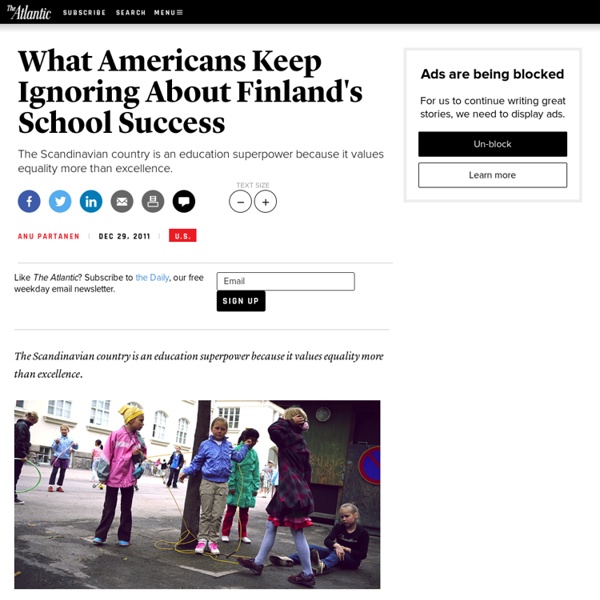



You can never replace the teacher. Or can you? 8 ways to learn without teachers. I learned nothing in school that was meaningful to me or that I used for success in life. All that just-in-case stuff was a 12-year-sentence that was wasted on me. Instead of being introduced to subjects in which I might be interested, I was turned off from them and was left without the opportunity to discover, develop, or enjoy my passions. Not only that, although I was at the top of my class, I never learned anything I was tested on. After I was forced to memorize and regurgitate onto the paper, the uninteresting, disconnected facts, stayed on the test. It is an embarrassment that I graduated high school retaining nothing I learned from my classes in science, social studies, English, math, or having the ability to speak a foreign language. I’m not saying no one likes or learns well in traditional school. e-Learning for Kids is a global, nonprofit foundation dedicated to fun and free learning on the Internet for children ages 5 - 12.
What’s the “problem” with MOOCs? « EdTechDev In case the quotes didn’t clue you in, this post doesn’t argue against massive open online courses (MOOCs) such as the ones offered by Udacity, Coursera, and edX. I think they are very worthy ventures and will serve to progress our system of higher education. I do however agree with some criticisms of these courses, and that there is room for much more progress. I propose an alternative model for such massive open online learning experiences, or MOOLEs, that focuses on solving “problems,” but first, here’s a sampling of some of the criticisms of MOOCs. Criticisms of MOOCs Khan Academy The organization is unclear and it lacks sufficient learner support.The videos aren’t informed by research and theory on how people learn, and this may diminish the effectiveness of his videos. Are MOOCs a Horseless Carriage? In the book How People Learn (which can be read free online), John Bransford shared the story of Fish is Fish. MOOC or MMORPG? From MOOC to MOOLE Who’s the teacher in a MOOLE?
Can You Pronounce All These Words Correctly? Rocketship Education: Overview Main Menu Section Menu Houston, We Have a Problem! The page you're trying to access got lost in space. Improving Students’ Learning With Effective Learning Techniques Many students are being left behind by an educational system that some people believe is in crisis. Improving educational outcomes will require efforts on many fronts, but a central premise of this monograph is that one part of a solution involves helping students to better regulate their learning through the use of effective learning techniques. Fortunately, cognitive and educational psychologists have been developing and evaluating easy-to-use learning techniques that could help students achieve their learning goals. In this monograph, we discuss 10 learning techniques in detail and offer recommendations about their relative utility. We selected techniques that were expected to be relatively easy to use and hence could be adopted by many students. Also, some techniques (e.g., highlighting and rereading) were selected because students report relying heavily on them, which makes it especially important to examine how well they work.
Mike McKay » Means or Ends. Where’s our Focus? One of our challenges in transforming education in the 21st century (Yes, there is more than one challenge) is that we act as if our structures – schools, classrooms, curriculum documents, districts… are ends in themselves rather than means to a desired end. How often do we find ourselves making the case for something – perhaps a format or structure – as if it is the end/the goal rather than just one of many possible means toward that declared end. In the education narrative, let’s agree on the desired end: to develop human capacity so that the next generation will be well equipped to make positive contributions to the world they will inherit. That “end in mind” is worth achieving! Knowing that “the education system” isn’t an eternal truth is helpful to our transformation journey. As you read this, you may be thinking of innovations that already break down barriers and make learning the focus rather than having the construct of schooling take centre stage.
8 Books For a Higher Existence Books are magical inventions. By carrying meaning, they gives us glimpses of experience and knowledge from a different world. Phonetic language, being cut-off from time and place, the Now, helps both to encapsulate the ego more, but also to offer guidance to make it poriferous, letting Eros free. Without books we would lose this guidance. If you’re done reading this list and want to level up more – check out part two! Thus Spoke Zarathustra – Friedrich Nietzsche Thus Spoke Zarathustra is Nietzsche’s most prophetic book in which he offers his teachings through the words of Zarathustra, based on the Persian prophet Zoroaster, who, after spending ten years on a mountain in meditation only accompanied by his Eagle and Serpent, comes down to offer his wisdom to the world. Becoming Animal – David Abram Abram’s first book The Spell of the Sensuous convincingly argued that being human is inseparably interconnected with everything that is not human. The Story of B – Daniel Quinn
12 Hot Mobile Medical Apps -- InformationWeek Mobile medicine is everywhere. There's the iPhone app that lets you cut away images of muscle layers to see what lies beneath, an e-health record system for the iPad, and a smartphone-based blood pressure monitor. Here are a dozen innovative ones. 1 of 12 This free iPhone app shows you extensive views of the muscle systems. You can tap to enlarge, rotate, and "cut away" a layer of muscle and see muscles underneath. More Insights
Nightcliff Middle School - Darwin NT